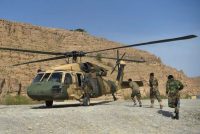
Afghan resistance to the Taliban needs U.S. support — and a big morale boost
Reeling from Taliban victories and the United States’ withdrawal, Afghanistan is in danger of losing the gains in women’s rights, a free press and democratic norms it has achieved over the past 20 years. But on a recent trip to the country, in meetings with government, opposition and military figures, I found a more complex picture — and some positive signals.
First, the bad: The Taliban has overrun many districts, cutting roads and isolating garrisons and checkpoints. Taliban forces have surprised foreign and Afghan militaries by shifting from the south and east — historically the areas of heaviest fighting — and attacking one of the weaker Afghan army corps in the north.… Seguir leyendo »

